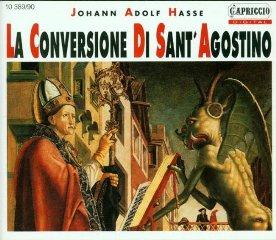Hasse - La Conversione di Sant' Agostino (1993)
Hasse - La Conversione di Sant' Agostino (1993)

1. Part I Introduction - Recitative: Più non t'affliger (Simpliciano, Monica, Agostino, Alipio) 00:07:33 Aria: Piangero, ma figlio amato (Monica) 00:08:48 Recitative: Ah, che il mio cor giammar (Agostino, Simpliciamo, Alipio) 00:04:31 Aria: Sentro orro del tuo delitto (Alipio) 00:04:17 Recitative: Ah, tu padre ammutisci (Agostino, Simpliciano) 00:02:20 Aria: Non abbandona mai Iddio (Simpliciano) 00:06:46 Recitative: Si solo a te mio Dio volger mi (Agostino) 00:03:39 Aria: Il rimorso opprime il seno (Agostino) 00:05:59 Recitative: Caro germano (Navigio, Agostino, Monica) 00:02:28 Aria: Come Fra venti insani geme (Navigio) 00:05:15 Recitative: E nessun Io soccore (Monica, Alipio, Simpliciano) 00:01:33 Inspira o Dio elemente (Monica, Alipio, Chorus) 00:02:53 2. Part II Recitative: Il figlio ancor non vedo, miscra! (Monica) 00:01:07 Aria: Ah, veder gia parmi il figlio (Monica) 00:05:02 Recitative: Simplician che rechi (Monica, Simpliciano, Alipio) 00:02:12 Aria: Piange e quel pianto (Alipio) 00:07:23 Recitative: Ecco che giunge a noi (Simpliciano, Agostino, Monica, Navigio) 00:08:01 Aria: Or mi pento, oh Dio (Agostino) 00:06:31 Recitative: Ah figlio (Simpliciano, Agostino, Monica, Alipio, Navigio) 00:05:19 Aria: A Dio ritornate (Simpliciano) 00:07:24 Si lodi il ciel pietoso (Chorus) 00:02:53 Mechthild Georg (Mezzo Soprano) Axel Köhler (Countertenor) Ralf Popken (Countertenor) Robert Wörle (Tenor) Gotthold Schwarz (Bass) Berlin RIAS Chamber Chorus Academy for Ancient Music Berlin Marcus Creed (Conductor)
La conversione di Sant' Agostino was first performed at Dresden's Taschenberg Palace on March 28th, 1750. It was Hasse's last oratorio and perhaps his most popular, enjoying numerous performances over the following 30 years or more. Surprisingly, it, rather than an opera, was chosen to open the theatre of the new palace of Sans-Souci in Potsdam in 1768. The Italian text, by the Dresden Electress Maria Antonia Walpurgis, is based on a Jesuit drama and deals with the conversion of St Augustine and his submission to God's will. There are five dramatis personae whose characters and preoccupations are quite subtly depicted by Hasse by means of extended passages of recitative, both unaccompanied and accompanied. The oratorio itself is conventionally laid out in two parts with alternating recitatives and arias, and a chorus which concludes the first and second parts, respectively.
Hasse's music is pleasing without being perhaps in any way remarkable or memorable. It is, however, effective and in the arias he shows us almost invariably how skilful he was in writing for the voice. Some of these, such as Simpliciano's aria in Part 1 (track 6), have lyrical melodies whose expressive lines are highlighted by the simple harmonic structure supporting them. The B-sections of da capo arias are usually well contrasted with their surrounding material and, as in his operas, the Italian influence is all-pervading.
This performance on two CDs is sympathetic while at the same time inclined to underplay the work's dramatic qualities. This has as much to do with the pacing as the singing which does convey a lively sense of theatre. There is, in fact, little in the way of action and the tension is generated more by inner conflict which Hasse portrays with musical painting of sensibility and restraint. The soloists make an evenly matched team. Mechthild Georg, as Augustine's mother, makes particular appeal but the remaining four singers are never less than adequate, usually rising well above that. The strings and oboes of the Berlin Ancient Music Academy are not quite as secure as we have come to expect from our best-known period instrument groups; but I found myself enjoying their lively playing once I had become accustomed to astringencies in tuning the occasional untidy ensemble. Marcus Creed sets effective tempos by and large and explores the wealth of the oratorio's expressive potential. The recording is ideally balanced and the booklet contains full texts in Italian, German and English. Well worth investigating.' ---Nicholas Anderson, gramophone.co.uk
download (mp3 @192 kbs):








